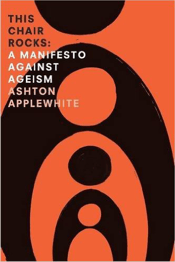Live Better Longer
![[]](images/left_chunk.jpg)
BOOK REVIEWS and Discussion Questions
This Chair Rocks: A Manifesto Against Ageism
The population is aging, we are living longer and healthier lives, and yet, ageism remains the last socially sanctioned bias. As Ashton Applewhite says in the introduction of
This Chair Rocks: A Manifesto Against Ageism, "Racist and sexist comments no longer get a pass, but who even blinks when older people are described as worthless? Or incompetent,
or ‘out of it’, or boring, or even repulsive?" Finding most terms used to describe older adults objectionable, Applewhite coins the term "olders" as a word she
describes as "clear and value-neutral."
In the chapter titled "Identity" Applewhite describes the negative effects of aging stereotypes. In one study, college students who had been primed with negative age stereotypes were observed walking more slowly than a control group. She questions what "age-appropriate" means and how it limits our choices as we age. Aging stereotypes begin young and as they grow more relevant, "people tend to act as though they were accurate, creating self-fulfilling prophecies."
Other chapters, such as "The Older Body", "The Older Brain" and "Sex and Intimacy" follow the same pattern of helping us look at aging in a new way by sharing research, stories and information that shift our view of aging from one of decline and helplessness to one of opportunity and growth. Each chapter concludes with a section titled "Push Back!" in which Applewhite offers strategies and suggestions for counteracting the issues identified in the chapter. She encourages readers to consider a different perspective and take action for change.
Research shows that people with more positive perceptions of aging live longer. A Yale study found those with "more positive self-perceptions of aging lived 7.5 years longer than those with less positive perceptions." Reading and embracing the wisdom in this wonderful book just might add years to your life. It certainly will make those years more joyous.
Discussion Questions
- When have you personally experienced age discrimination?
- How has your understanding of age discrimination changed since reading this book?
- How has thinking about what is “age appropriate” affected your choices or behavior?
- Applewhite cites studies showing that people are most miserable in middle age and happiest in childhood and at the end of life. How does your life fit with the “happiness bell curve”?
- Applewhite exhorts us to keep the “organ recital”-a list of our aches and ailments-short. How do you feel when you are a listener or speaker in the “organ recital”?
- Applewhite describes the “independence trap”. How does this thinking affect your future plans?
- On page 239, Applewhite gives ideas for how to start to move beyond ageism. Which ones seemed the most doable for you?
- What was your most important take-away from reading this book?
- What changes might you make as a result of reading this book?
This Chair Rocks: A Manifesto Against Ageism, Ashton Applewhite
Perfect Paperback, 288 pages
Published March 15th 2016 by Networked Books, Inc.
0996934707 (ISBN13: 9780996934701)
Perfect Paperback, 288 pages
Published March 15th 2016 by Networked Books, Inc.
0996934707 (ISBN13: 9780996934701)

